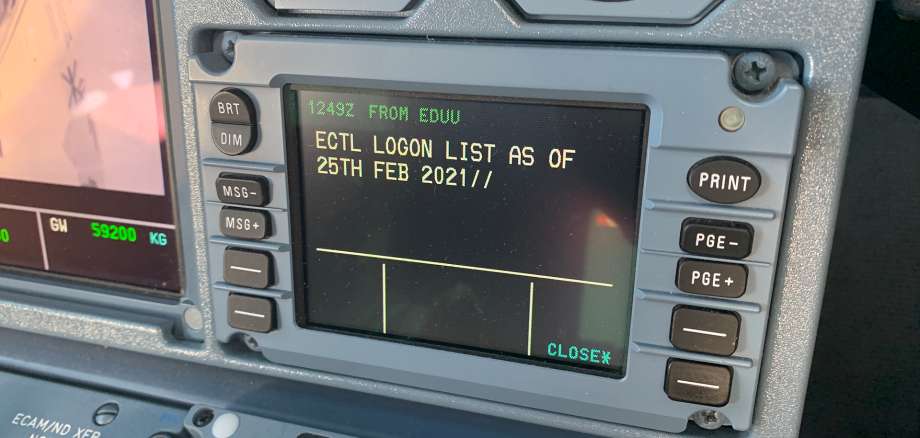Since the end of February, DFS, the German air navigation service provider, has been using EUROCONTROL's Logon List for the approval of aircraft for data link communications in upper airspace. The central list ensures lower dropout rates in the data link connection to aircraft and thus stable and reliable communications, especially when traffic volumes are high, which can be expected after the Coronavirus pandemic passes. To achieve the necessary high performance level, aircraft have to be equipped with the right avionics.
Using controller-pilot data link communications (CPDLC), pilots and air traffic controllers can go beyond voice communications by exchanging standardised text messages. These messages can convey level clearances, headings or the transfer of control to the next sector, for example.
Since February 2020, aircraft flying in the central areas of Europe's upper airspace must be equipped with appropriate avionics (Commission Implementing Regulation (EU) No 2015/310).
The DFS controllers at the Karlsruhe Upper Area Control Centre have been using data link since 2012. In January 2020, prior to the Coronavirus pandemic, close to 4,700 data link messages were exchanged daily between controllers and cockpit.
Since the introduction of CPDLC, usage has increased sharply. Occasionally, data-link connections are interrupted; the reasons for this are to be found both on the ground and in the cockpit. Some avionics is not suitable for the European Very High Frequency (VHF) Data Link (VDL) Mode 2 network used to exchange data between aircraft and ground stations. Sometimes, it is also due to the software version of the cockpit modules.
For the smooth handling of air traffic, as well as more efficiency and capacity, airlines and pilots need to equip their aircraft with appropriate, harmonised and up-to-date avionics and enter this data in the Logon List in EUROCONTROL's network at https://ext.eurocontrol.int/WikiLink/index.php/Logon_List. Further information is available there.
The Logon List has been in existence since 2013 and was formerly known as the Black and White List. It was used by the Maastricht Upper Area Control Centre (MUAC) and later also by Skyguide.
DFS is joining MUAC and Skyguide and has adapted its system and software to work with EUROCONTROL's Logon List, too. For operational queries, airlines can contact DFS directly at CPDLC.Karlsruhe@dfs.de.
Downloads
Media contact:
DFS Deutsche Flugsicherung GmbH
Nanda Geelvink
Telephone: +49 (0)6103 707 4164
E-mail: presse@dfs.de
DFS Deutsche Flugsicherung GmbH, the German air navigation service provider, is a State-owned company under private law with 5,600 employees as at 31 December 2020. DFS ensures the safe and punctual flow of air traffic over Germany. Before 2020, around 2,200 air traffic controllers guided up to 10,000 flights in German airspace every day, more than 3 million movements every year. The company operates control centres in Langen, Bremen, Karlsruhe and Munich as well as control towers at the 16 designated international airports in Germany. The subsidiary DFS Aviation Services GmbH markets and sells products and services related to air navigation services, and provides air traffic control at nine regional airports in Germany and at London Gatwick Airport and Edinburgh Airport in the UK. R. Eisenschmidt GmbH is another DFS subsidiary which markets publications and products for General Aviation. Kaufbeuren ATM Training (KAT) is responsible for training military air traffic services personnel. DFS has been working on the integration of drones into air traffic since 2016 and has set up a joint venture, Droniq GmbH, with Deutsche Telekom.
